Asilomar 2017 31st Annual Asilomar Conference
The Weekend Of February 10-13, 2017
Where is Asilomar? The beautiful Asilomar Conference Grounds was designed in the Arts & Crafts style by architect Julia Morgan and is located near Monterey, California. We have held our conference there for the past 30 years. For more see the Wiki
Sign Up For The Upcoming Asilomar“A faithful study of liberal arts humanizes character, and allows it not to be cruel.” -- Ovid
If the news of the day is getting you down, take heart – it’s once again time to reserve your weekend of learning, inspiration and fellowship on the magnificent Monterey coast!
Past participants describe the weekend as “the best aspects of college, without the exams” and “the greatest high of the year – without drugs!”
If you have questions on this year’s program, please contact dfrontczak@scu.edu. For registration or logistics matters, please contact Barry Haskell at bghaskell@comcast.net. Cost is the same as last year, $545 per person, double ocupancy, and includes all nine meals and parking. All registered participants will receive forms to reserve their Asilomar accommodations, including meals, during the month of October; please watch your email for more details.
Deirdre Frontczak, Asilomar Chair
Details Of 2017 Speakers Include:
Fred Lawrence, Our Newly Appointed Secretary Of The PBK Society, Spoke At Asilomar On Sunday Morning, February 12
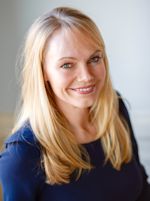 Dr. Anja Manuel, International Policy Studies, Stanford, Friday evening
Dr. Anja Manuel, International Policy Studies, Stanford, Friday evening
India and China: The New Superpowers
In the next decade and a half, China and India will become two of the world’s indispensable powers—whether they rise peacefully or not. During that time, Asia will surpass the combined strength of North America and Europe in economic might, population size, and military spending. India and China will have vetoes over many international decisions, from climate change to global trade, human rights, and business standards.
From her front row view of this colossal shift, first at the State Department and now as an advisor to business leaders and a lecturer at Stanford University, Anja Manuel takes us on an intimate tour of the corridors of power in Delhi and Beijing. We wring our hands about China, Manuel writes, while we underestimate India, which will be the most important country outside the West to shape China’s rise. Manuel shows us a different path: We can bring China and India along as partners rather than alienating one or both, and thus extend our own leadership in the world.
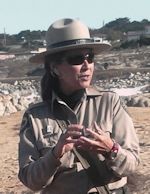 Lisa Maldonado Bradford, Asilomar, Saturday morning
Lisa Maldonado Bradford, Asilomar, Saturday morning
The Remarkable Women of Asilomar
Asilomar is an unusual state park – a mile of ocean front trail, a sandy State Beach, a 25-acre Natural Dunes Preserve, and a busy conference venue – approximately 107 acres in all. But even more, the site has played a key role in the evolution of many ideas that have shaped modern life, particularly the emergence of the women’s movement in California via the YWCA platform. This talk with accompanying PowerPoint, presented by Asilomar’s Cultural Resource specialist, offers a unique insight into the backgrounds of some of the notable women whose passion and commitment to the YWCA goals – encouraging higher education for women and creating an environment of greater ethnic diversity – have left an enduring mark on Asilomar from its inception in 1913 to the great resource we treasure today.
Molly King Ph.D. Candidate, Stanford, Saturday afternoon
Who Owns Knowledge? Information Inequalities by Class, Gender and Race
What do people know, and how do class, gender, and race affect that knowledge? In this talk, we will explore demographic differences across all domains of knowledge (from health to religion, sports to history) and the implications of these inequalities for people's lives. For example, do women know more than men, or does the upper class know more the middle class? We’ll also look at whether there are certain domains in which the usual group hierarchies are subverted: Is the upper class, for example, omnivorous in the sense that it knows everything about everything, or is its knowledge restricted to certain specialized domains? In our modern information economy, inequalities in this “information capital” between groups are more critical than ever to individual outcomes.
A Ph.D. candidate in sociology at Stanford, King is a 2016 ΦBKNCA Scholarship awardee.
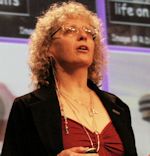 Dr. Penelope Boston, NASA Ames, Saturday evening
Dr. Penelope Boston, NASA Ames, Saturday evening
The Astrobiology of the Subsurface:
Exploring Cave Habitats on Earth, Mars and Beyond
 We are using the spectacular underground landscapes of Earth caves as models for the subsurfaces of other planets. Caves have been detected on the Moon and Mars and are strongly suspected for other bodies in the Solar System including some of the ice covered Ocean Worlds that orbit gas giant planets. The caves we explore and study include many extreme conditions of relevance to planetary astrobiology exploration including high and low temperatures, gas atmospheres poisonous to humans but where exotic microbes can flourish, highly acidic or salty fluids, heavy metals, and high background radiation levels.
We are using the spectacular underground landscapes of Earth caves as models for the subsurfaces of other planets. Caves have been detected on the Moon and Mars and are strongly suspected for other bodies in the Solar System including some of the ice covered Ocean Worlds that orbit gas giant planets. The caves we explore and study include many extreme conditions of relevance to planetary astrobiology exploration including high and low temperatures, gas atmospheres poisonous to humans but where exotic microbes can flourish, highly acidic or salty fluids, heavy metals, and high background radiation levels.
Some cave microorganisms eat their way through bedrock, some live in battery acid conditions, some produce unusual biominerals and rare cave formations, and many produce compounds of potential pharmaceutical and industrial significance. We study these unique lifeforms and the physical and chemical biosignatures that they leave behind. Such traces can be used to provide a “Field Guide to Unknown Organisms” for developing life detection space missions.
In 2015, Penny served as a national Visiting Scholar for the PBK Society, and as a guest speaker for the Denver Triennial – where she was truly a star! Some recent rticles are here:
https://www.sciencenews.org/article/microbes-survived-inside-giant-cave-crystals-50000-years
http://news.nationalgeographic.com/2017/02/crystal-caves-mine-microbes-mexico-boston-aaas-aliens-science/#/01_crystal_cave.jpg
https://phys.org/news/2017-02-biologists-weird-cave-life-years.html
https://astrobiology.nasa.gov/news/penelope-boston-on-subsurface-astrobiology-cave-habitat-on-earth-mars-and-beyond/
http://learningenglish.voanews.com/a/mexico-cave-super-life/3738458.html
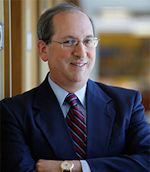 Dr. Frederick M. Lawrence The Phi Beta Kappa Society and Yale Law School,. Sunday morning
Dr. Frederick M. Lawrence The Phi Beta Kappa Society and Yale Law School,. Sunday morning
The Contours of Expression: Free Speech and Civility
Across the country, conflicting claims of free expression, civility, and safety raise complex issues on campuses, in communities, and throughout social media. How do we balance opposing values to enable free expression, yet foster a climate of mutual respect and sense of personal safety in our discourse on important topics? Drawing on his scholar’s expertise of free expression and hate crimes, as well as his new role as Secretary/CEO of The Phi Beta Kappa Society, Fred Lawrence will explore the social aspects of “vigorous civility” as a solution to the challenges of determining proper boundaries of free expression, and the importance of an arts and sciences perspective in facing societal issues.
Elan Portner, Ph.D. Candidate Stanford, Sunday evening ,
Open ocean food webs: how we study the largest habitat on Earth
The open ocean contains over 95% of habitable space on our planet and is utilized by the most abundant organisms on the planet, many of which undergo the largest known migrations. Its expansiveness, and the fact that most of this habitat lies far beneath the ocean's surface, make it a particularly difficult system to study – but also makes the potential for discovery immense. Scientists use nets, cameras, sound, and surprising assistants to learn about how organisms in these habitats interact and how they respond to natural and anthropogenic pressures. Dive in to an interactive seminar and get introduced to the hidden wonders of the open ocean.
A student of ocean ecosystems at Stanford University, Portner is a 2016 ΦBK-NCA scholarship awardee.
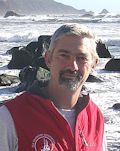 Stephen Palumbi, Stanford Woods Institute, Monday morning
Stephen Palumbi, Stanford Woods Institute, Monday morning
A Grand Bargain for the Future: The oceans under climate change
A senior fellow with the Stanford Woods Institute for the Environment, Palumbi studies the genetics, evolution, conservation, population biology and systematics of a diverse array of marine organisms. In particular, he is focused on the use of molecular genetic techniques in conservation, including the identification of whale and dolphin products offered in commercial markets. This talk will explore issues raised in his recent book, The Evolution Explosion: How Humans Cause Rapid Evolutionary Change, which shows how rapid evolution is central to emerging problems in modern society – and to efforts to resolve them.
Asilomar Chair, Deirdre Frontczak
